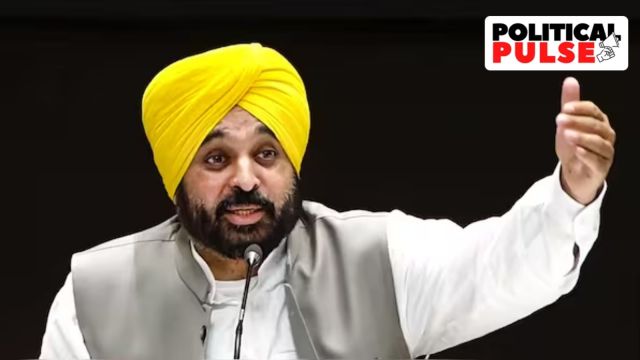New row brews on farm front, Punjab equates Centre’s draft policy to the three scrapped laws
Ruling AAP and Opposition parties are agreed in opposition to Centre’s plans, which they say could lead to dismantling of the mandi system
 Punjab, one of India’s largest producers of wheat and rice, operates within a well-established mandi system and these reforms could undermine the state’s agricultural economy, pushing farmers into an unregulated and unprotected market. (PTI)
Punjab, one of India’s largest producers of wheat and rice, operates within a well-established mandi system and these reforms could undermine the state’s agricultural economy, pushing farmers into an unregulated and unprotected market. (PTI)After its recent communication with the Centre regarding dues and assistance for new projects, it looked like the Punjab government was on a conciliatory path with the powers in New Delhi. But the Bhagwant Mann government’s rejection of the Centre’s newly announced National Policy Framework on Agricultural Marketing looks set to sour the relationship again.
Punjab Agriculture Minister Gurmeet Singh Khuddian said the state would communicate its “rejection” of the policy to the Centre soon.
On Monday, after meeting officials of Punjab Agriculture University, the Punjab State Farmers’ Commission and the Agriculture Department, Khuddian claimed the draft policy was “an attempt to bring back the (now-repealed) controversial farm laws through the back door”.
Khuddian said the policy was “yet another attempt by the BJP-led Centre to impose top-down reforms that could undermine the state’s agrarian structure and the livelihood of its farmers”.
Farmers in Haryana have announced protests across the state on Friday against the draft policy.
What explains Punjab’s reaction
Punjab, one of India’s largest producers of wheat and rice, operates within a well-established mandi system as part of which crops are sold through regulated markets.
This system, the state argues, provides farmers an assured Minimum Support Price (MSP) and shields them from price volatility. The contention of the Aam Aadmi Party (AAP) in Punjab is that the Centre’s new policy could lead to the dismantling of the mandi system, leaving farmers vulnerable to exploitation by profit-driven private players.
The fear in Punjab is that these reforms could undermine the state’s agricultural economy, pushing farmers into an unregulated and unprotected market.
At the press conference after meeting different stakeholders, Khuddian said the new framework could “lead to the exploitation of farmers”. “The draft policy is clear that the Centre is moving towards privatisation. If implemented, the policy will ruin the existing procurement system in Punjab which has a robust infrastructure of mandis, yards and road network worth hundreds of crores of rupee,” Khuddian said.
He specifically mentioned a provision of the framework that advocates imposing a single tax across the country on the goods sold in mandis. “But the GST (Goods and Sales Tax) experience is in front of us. The states have suffered huge losses due to this. The Centre used to say that they would give us incentives, but what did we get?… The states plead before the Central government to get their own money,” Khuddian said.
The Opposition in Punjab — which does not want to be seen as anti-farmer — are with the AAP on the issue. The Shiromani Akali Dal, whose fortunes in Punjab have been declining, said the policy was another attempt to bring back the farm laws.
Akali Dal Bathinda MP Harsimrat Kaur Badal wrote on X: “… The Centre has come out with a draft agriculture marketing policy which is silent on MSP but wants to centralise agri-marketing.” She added that agriculture was a “state subject” and that the new policy would bypass “state marketing committees” and pave the way for “contract farming”, adding thatthese provisions were part of the now-repealed farm laws.
Senior Congress leader Partap Singh Bajwa said the policy “aims to dismantle the very system that protects farmers from exploitation”. “PM (Narendra) Modi promised to double farmers’ incomes by 2022… Two years past the deadline, that promise remains unfulfilled. Instead of ensuring MSP as a legal right, this policy plans to snatch away even the little that farmers currently earn,” Bajwa said.
What the Centre says
On November 25, a committee formed by the Ministry of Agriculture and Farmers’ Welfare circulated the draft National Policy Framework on Agricultural Marketing, seeking public comments or suggestions.
As per the draft, the Department of Agriculture and Farmers’ Welfare has been working with states for more than two decades to reform agricultural marketing. “But, the progress on the ground has not been satisfactory and the penultimate objective of making available an accessible market to farmers with better return for their produce has not been achieved to the desired level,” the draft said.
It goes on to propose an ‘Empowered Agricultural Marketing Reform Committee of State Agricultural Marketing Ministers’ on the lines of Empowered Committee of State Finance Ministers on GST “to push the states to adopt reform provisions in the state Agricultural Produce Market Committee (APMC), notify the rules, and also build up the consensus among the states to move towards unified national market for agriculture produce through a single licensing/registration system and single fee.”
The draft says the empowered committee may be chaired by the agriculture minister of any state on rotational basis, with agriculture ministers of the remaining states as members.



- 01
- 02
- 03
- 04
- 05


























